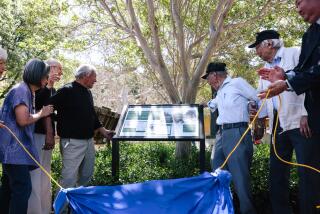Former WWII Prisoner of War Gets Belated Honor
- Share via
It has been more than 50 years since Richard Gillett spent 3 1/2 years as a prisoner of war in Japanese camps during World War II.
But on Friday, the 78-year-old retired U.S. Air Force lieutenant colonel from Buena Park received a Prisoner of War medal.
“It’s to honor his service to his country and the sacrifices he endured,” Ron Gillett, a Fullerton police sergeant, said of the medal his father received.
Ron Gillett contacted Rep. Ed Royce’s (R-Fullerton) office last fall for his assistance in getting the medal. The ceremony Friday, attended by Gillett’s family, was held in Royce’s Fullerton office.
“His resolution and determination in the face of adversities have allowed Americans to enjoy liberty, prosperity and freedom today,” Royce said.
At age 20, Gillett left his hometown of El Centro and joined the military on Sept. 6, 1940. He was sent to aviation cadet training in San Diego and, upon graduation, became a fighter pilot.
Several weeks after graduation, he was sent to the Philippines and was there when the war broke out.
He completed 15 combat missions, totaling 35 hours of combat, and shot down one Japanese fighter plane before being captured on April 9, 1942. A day later, he was forced on the Bataan Death March with other American and Filipino prisoners. Gillett said he cannot forget being thirsty, or witnessing the deaths of fellow war buddies.
In December 1942, Gillett was taken to Japan and was put to work in a steel factory with other prisoners of war. He also was forced to work in the agricultural fields. Gillett recalled how during his captivity, he was moved to several camps where many American soldiers died from starvation or the harsh cold. He remained a prisoner until the end of the war in September 1945.
During his military service, Gillett received a number of decorations and awards, including the Purple Heart. During the early part of the war when the airfield was bombed, he was hit in the leg by shrapnel. He also earned three Bronze Service Stars for his participation in the Philippines campaign.
After 24 years, he left military service in September 1964. He worked in the outdoor advertising business, retiring in 1994.
Gillett shrugs off the honor of receiving the POW medal: “I didn’t win the war. I just was apprehended and sat the war out.”
He said he accepted the medal not for his own sacrifices but for those left behind in POW camps.
“I take it for the people who are still over there--who will never come home. They died over there. They’re the ones who deserve the medal,” Gillett said. “I’m healthy, retired, and I’ve had a good life.”
More to Read
Sign up for Essential California
The most important California stories and recommendations in your inbox every morning.
You may occasionally receive promotional content from the Los Angeles Times.













